INSIDE STATEHOUSE REPORT | ISSUE 20.12 | MARCH 19, 2021
BIG STORY: Proposed $500 million fund is new to state’s $10 billion spending plan
NEWS BRIEFS: Epidemiologists worry about another state virus surge
LOWCOUNTRY, Ariail: Pot o’ Green
COMMENTARY, Brack: Don’t buy specious logic on unsafe gun proposal
SPOTLIGHT: South Carolina Farm Bureau
MY TURN, Cook: Include climate change in public health policy efforts
FEEDBACK: Budgets are important
MYSTERY PHOTO: Brick buildings
$500 million fund is new to state’s $10 billion spending plan

By Andy Brack, editor and publisher | South Carolina House members will consider something new next week in the state’s $10 billion budget — a single line item that sets aside $500 million to keep agencies from making midyear cuts that could be brought on by unexpected pandemic expenses.

“That is General Fund money (or money from state taxes) that was set aside as a first line of defense should revenues not continue to remain positive and stable,” said S.C. House Ways and Means Chairman Murrell Smith, R-Sumter.
The state currently has two reserve, or “rainy day,” funds. But rules on those funds restrict spending to balancing the state budget at the end of the fiscal year. In other words, if an agency had a shortfall during the year from something, like say a pandemic, then it would have to make program cuts, lay off workers — or both.
Last fall, Senate and House staffers started discussing ways to give agencies more flexibility in case revenue streams are hit after July 2021 because of economic reactions to the pandemic. They came up with the notion of setting aside $500 million in surplus dollars if things go awry. But if nothing is spent by June 30, 2022, lawmakers can use the money for something else — or keep the reserve intact for other midyear rainy day needs as might come with a hurricane or flood.
Observers say this is smart budgeting because it anticipates challenges with a solution that will improve the stability of the budget so state agencies don’t have ups and downs with staffing and programs.
More money could be available
Smith said the proposed state budget, which will be debated on the House floor starting 1 p.m. Monday, should be considered “very conservative” as there were few increases to general operations of most agencies. But revenues could grow if the state Board of Economic Advisers (BEA) boosts revenue estimates in April from state taxes. A year after the pandemic started, the Palmetto State has an unemployment rate of just over 5 percent, which is just 1 percent off historic lows before the health crisis that kept many people at home for months.
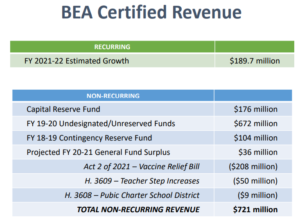 “The majority of the new funds were spent on agency needs and additional reserves,” he told Statehouse Report. “I believe if we continue down the same track we are on now, the BEA will most likely increase the estimate in April.
“The majority of the new funds were spent on agency needs and additional reserves,” he told Statehouse Report. “I believe if we continue down the same track we are on now, the BEA will most likely increase the estimate in April.
“In the event that revenues decline, then we should be able to continue government at the same spending levels without laying off state employees with this budget.”
Smith said he was particularly proud of two things funded in the 2021-22 spending plan.
First is the $50 million set aside to pay for another reserve fund for disaster relief and resilience after lawmakers passed a law last year that created a state Office of Resilience. The new fund will allow the state to pay for disaster assistance, hazard mitigation, infrastructure improvements and resilience planning. A recent budget proposal by Gov. Henry McMaster called for funding the office, but not the reserve.
Second, Smith pointed to $30 million targeted to expanding broadband service, which is particularly important for rural areas of the state for business and education.
General budget overview
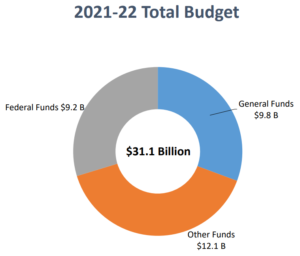 The 2021-22 budget for the state will top $31 billion. Of that, $9.8 billion will come from state taxes, such as taxes on income and sales. Another $9.2 billion will come from federal sources, such as dollars that flow through state agencies for roads, Medicare and Medicaid. And then there’s $12.1 billion in “other funds,” an account that generally includes monies that got to the state that aren’t General Fund dollars — things like college tuition, gas taxes, Education Improvement Act funds and receipts from the state’s education lottery.
The 2021-22 budget for the state will top $31 billion. Of that, $9.8 billion will come from state taxes, such as taxes on income and sales. Another $9.2 billion will come from federal sources, such as dollars that flow through state agencies for roads, Medicare and Medicaid. And then there’s $12.1 billion in “other funds,” an account that generally includes monies that got to the state that aren’t General Fund dollars — things like college tuition, gas taxes, Education Improvement Act funds and receipts from the state’s education lottery.
In the next year, lawmakers currently anticipate more than $900 million in new revenues, including $190 million in recurring revenues from the growth in the state’s tax base as well as $721 million in non-recurring, or one-time, revenues stemming from reserves and surpluses.
- Read the briefing that House members got on the budget.
- Read the state budget (all 1,790 lines of it).
Major state general fund spending highlights
Reserves: $500 million for the Pandemic Stabilization Reserve Fund; and $26 million in added funding to the capital and general reserve funds. With this budget, the state’s reserves are $1.1 billion, according to the committee.
Education: $50 million to increase the base student cost to $2,500 per student and a like amount for one-time pay increases to eligible teachers. The Department of Education’s $3.3 billion base share of state dollars includes an additional $48 million in instructional materials, $24.5 million for public charter school growth; and $10 million to expand full-day 4-year-old public kindergarten.
Higher education: Colleges and universities will get $171 million in new money, the lion’s share of which will go to deferred maintenance. The state’s technical college system will get $10 million for maintenance and capital needs as well as $33 million for workforce scholarships. Lawmakers also call for steering $318 million to fund LIFE, HOPE and Palmetto Fellows college scholarships, $51 million from the lottery for tuition help and $80 million to pay for tuition grants.
Economic development: The budget calls for an additional $3.7 million in the state’s deal-closing fund to attract more business and $20 million to promote tourism.
Health care: The House budget proposes $20 million more for child welfare programs and $27 million to match federal money for two veteran nursing homes.
Criminal justice: $90 million from federal funding for prison safety upgrades; and $17.9 million for staffing increases and retention needs.
Also in the budget is $17.6 million for the state’s judiciary for an online court project and case management improvements; $2 million for more conservation grants; $5.9 million for health and dental insurance cost increases for state employees; $36 million to boost the employee pension system; and $17.6 million for a local government fund to offset tax losses.
- Have a comment? Send to: feedback@statehousereport.com. Make sure to add your name and contact information for verification.
Epidemiologists worry about another state virus surge

By Samantha Connors, special to Statehouse Report | With more than 50 percent of South Carolinians now eligible to receive a COVID vaccination under phrase 1B of the state’s rollout plan, demand is high but supply remains low.
According to the South Carolina Department of Health and Environmental Control (DHEC) vaccine allocation dashboard, 94 percent of Pfizer-BioNTech vaccines and 70 percent of Moderna doses have been administered. Based on data from the dashboard, there are currently 657, 171 Pfizer and Moderna appointments scheduled though roughly 300,000 doses of these two vaccines remain.
The state received 59,000 doses of the one-shot Johnson & Johnson Janssen vaccine, but with 44 percent of that vaccine already being utilized, the state needs to receive more shipments soon to keep up with demand.
DHEC reported 856 new cases out of 18,794 individual tests on Thursday, a positive rate of 6.3 percent.
Samantha Connors is web editor of the Charleston City Paper.
In other recent news:
![]() S.C. House gives green light to open carry of handguns. House members voted 82-33 in favor of the open carry with training bill after hours of debate. Some Democrats joined Republicans in the vote. The bill would allow persons with concealed weapons permits to keep those guns visible in public. Hopkins Democratic Rep. Jermaine Johnson called the bill “no more than legalized hunting for Black people.” The bill now heads to the Senate. More: AP News.
S.C. House gives green light to open carry of handguns. House members voted 82-33 in favor of the open carry with training bill after hours of debate. Some Democrats joined Republicans in the vote. The bill would allow persons with concealed weapons permits to keep those guns visible in public. Hopkins Democratic Rep. Jermaine Johnson called the bill “no more than legalized hunting for Black people.” The bill now heads to the Senate. More: AP News.
S.C. legislators add sexual orientation back to hate crime bill. A group of South Carolina lawmakers have added back protections for gay or transgender people to a hate crime bill, five days after removing them. More: AP News.
S.C. has one of worst wage gaps in nation, study says. A recent study has found that South Carolina has one of the worst wage gaps for women among states and the District of Columbia. Business.org ranks the Palmetto State 40th with a gap of 23% — an average salary for women of $37,584 compared to $48,541 for men. This means that women essentially stop getting paid on Oct. 8 for the work year. More: The Greenville News.
S.C. jobless rate falls again to 5.3%. The S.C. Department of Employment and Workforce reported Monday January’s unemployment rate fell to 5.3%, down from December’s rate for 5.6%. Agency Director Dan Ellzey said in a statement, however, that the number of job searches made by people collecting jobless benefits is low and said the agency will soon enforce requirements for a certain number of job searches. More: AP News.
Hate crime bill urged by Emanuel AME Church pastor. The Clementa Pinckney Act, House Bill 3620, has passed the House’s Judiciary Committee and is on its way to debate on the House floor. The bill’s name honors one of the victims of the 2015 white supremacist rampage that killed nine people at a Charleston church. Pinckney was also a state senator. The bill seeks to add racial and other bias motivations for crimes to offenses. The state currently does not have any hate crime legislation, making it one of four in the nation. More: WCBD.
State flag design continues to spark debate. South Carolina senators may soon take up one of the most divisive issues to hit the state in years: standardizing the state flag’s iconic design. More: AP News.
Charleston shelter seeks $1M to fuel statewide no-kill effort. The Charleston Animal Society on Sunday announced plans to make South Carolina become a “no-kill state” for animals by 2024 through a $1 million challenge grant from the Petco Foundation. More: Charleston Currents.
S.C. lawmakers reject transgender sports ban bill. A South Carolina House committee rejected a bill Tuesday that would have prevented transgender students from playing on girls’ sports teams in middle and high schools. More: AP News.
Pot o’ Green
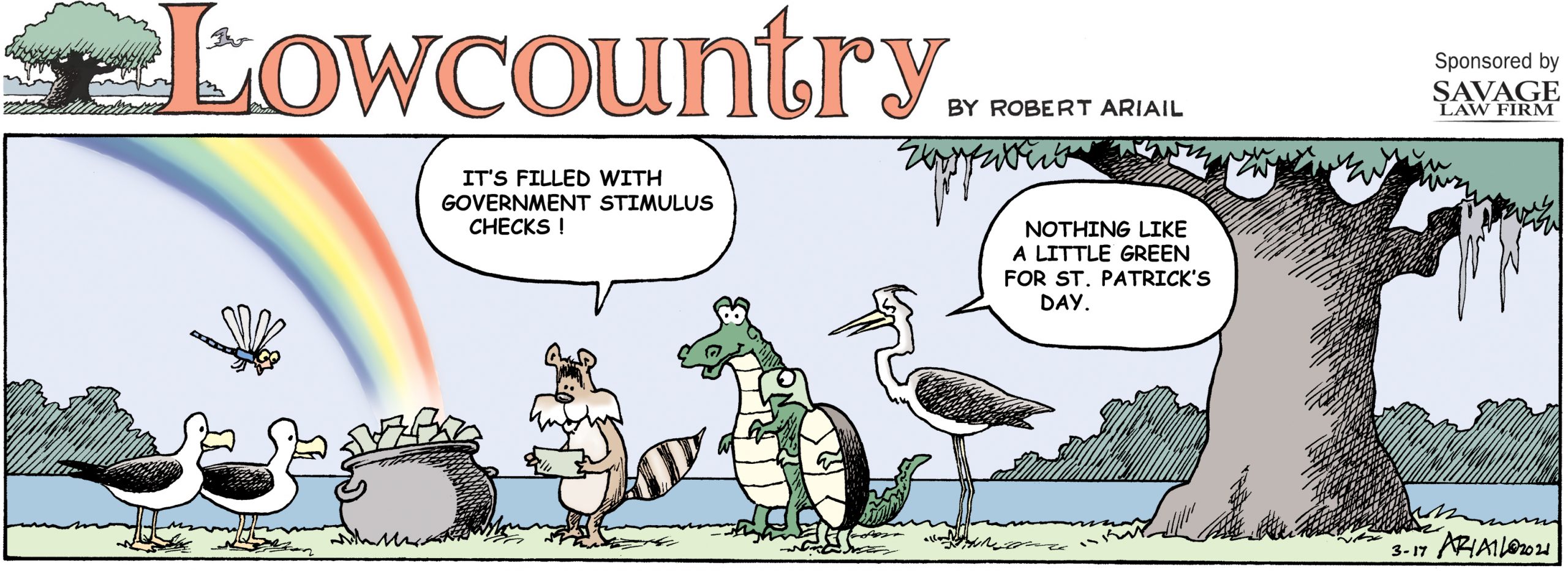
Here’s a new cartoon by Robert Ariail that first was published in our sister newspaper, the Charleston City Paper. Love it? Hate it? What do you think: feedback@statehousereport.com.
Don’t buy specious logic on unsafe gun proposal

By Andy Brack, editor and publisher | Different day, same story: Man buys a handgun and goes on a same-day rampage, killing several people.
 Everyday citizens say they’re shocked, but how can they be? This is the umpteenth time this narrative has played out.
Everyday citizens say they’re shocked, but how can they be? This is the umpteenth time this narrative has played out.
This week it was in the Atlanta area. The lone suspect shot nine people Tuesday. Eight died. The shooter is described as a “super nice, super Christian” who told authorities he had a sex addiction and targeted three spas to eliminate temptation.
Next week? It could be anywhere. Guns are so ubiquitous and easy to get that it’s hard to find a place safe from the potential of random gun violence.
When will we learn? When will we learn porous gun laws and, even worse, expanding “gun freedoms” are a plague on our society. It’s a vicious cycle — people want more guns because they’re afraid. And they’re afraid because of all of the violence in America that can be traced back to what? Cotton candy? No, guns.
Legislators have chances to do something smart on guns, rather than the path they’re headed on.
At the federal level, a smart thing is to reinstate a national waiting period for the purchase of guns — something that responsible gun owners generally don’t oppose. At the state level, South Carolina legislators should close the so-called “Charleston loophole,” which firearms sellers take advantage of to sell guns if a background check has not come back in three days. This is the loophole that South Carolina racist Dylann Roof used to murder nine people at Emanuel AME Church in Charleston almost six years ago. U.S. Rep. Jim Clyburn, D-S.C., recently reintroduced a proposal to close the loophole by extending the background check period to 10 days. South Carolina lawmakers should do it now.
What South Carolina legislators do not need to do is to expand the pervasiveness of guns. Already on the books are processes and procedures for citizens who want to be armed to get concealed weapons permits if they want more security.
But is that good enough? Apparently not. Hours after the Atlanta slaughter, South Carolina House members threw caution to the wind and passed a bill that will thrust handguns into the open.
S.C. Rep. Phillip Lowe, R-Florence, actually had the gall to say on the House floor this week that open carry was needed because of South Carolina’s heat. Opening his jacket at the podium, he said when someone with a concealed weapons permit was carrying a gun they would violate the permit if they took off the jacket because it was hot … and that’s why open carry was needed.
Really? Was he serious? In my book, if you have a concealed permit and you want to carry, you should put up with a little sweat as the price to pay to feel safe. Guns that are out in the open are much more dangerous than one locked away at home.
The chief proponent of the open carry bill is Rep. Bobby Cox, a Greenville Republican who (surprise) works for a handgun manufacturer. His argument, equally as specious as Lowe’s, is we need the open carry rule to bring us in line with what goes on in 45 states. Hogwash. Just because other states are doing something wrong doesn’t mean we must, too..
“This is sending a message that these legislators and myself stand with the citizens of South Carolina to protect our constitutional freedoms,” Cox said this week.
Double hogwash. Citizens currently can legally purchase guns. Not having open carry does not impinge on their freedoms. Rather, they just have to follow reasonable rules — just as they do if they want to drive cars or live in a civilized society.
Democratic state Rep. Jermaine Johnson of Hopkins painted a dramatic picture.
Open carry, he said, is an example of white privilege. But any Black person like him — a former college basketball player with tattoos who is 6 feet and 7 seven inches tall — would be in real danger if he openly carried a handgun.
“This bill as it stands will be no more than legalized hunting for Black people,” Johnson said.
Call your state senator today and urge him or her to shut down open carry legislation that will make South Carolina far less safe.
Andy Brack is editor and publisher of Statehouse Report and publisher of the Charleston City Paper. Have a comment? Send to: feedback@statehousereport.com.
South Carolina Farm Bureau
 Statehouse Report is provided for free to thousands of subscribers thanks to the generosity of our underwriters. Today we shine a spotlight on our newest underwriter, S.C. Farm Bureau. It is a grassroots, non-profit organization that celebrates and supports family farmers, locally-grown food and rural lands through legislative advocacy, education and community outreach.
Statehouse Report is provided for free to thousands of subscribers thanks to the generosity of our underwriters. Today we shine a spotlight on our newest underwriter, S.C. Farm Bureau. It is a grassroots, non-profit organization that celebrates and supports family farmers, locally-grown food and rural lands through legislative advocacy, education and community outreach.
S.C. Farm Bureau’s alliance of nearly 100,000 members includes everyone from foodies and fishermen to lawyers, restaurateurs, entrepreneurs, community leaders, and of course, farmers. By connecting farmers to the larger community, the organization cultivates understanding about agriculture’s importance to our local economies. The S.C. Farm Bureau explains its mission: “We deepen our collective knowledge of who, where and how food grows. We empower people to make informed choices. We grow mutually-beneficial relationships. And, we ensure the future of the family farms, locally-grown food and the rural South Carolina lands we love.”
- To learn more about S.C. Farm Bureau’s programs, click here.
- To view media and publications, click here
- For policy and legislation, click here.
Include climate change in public health policy efforts
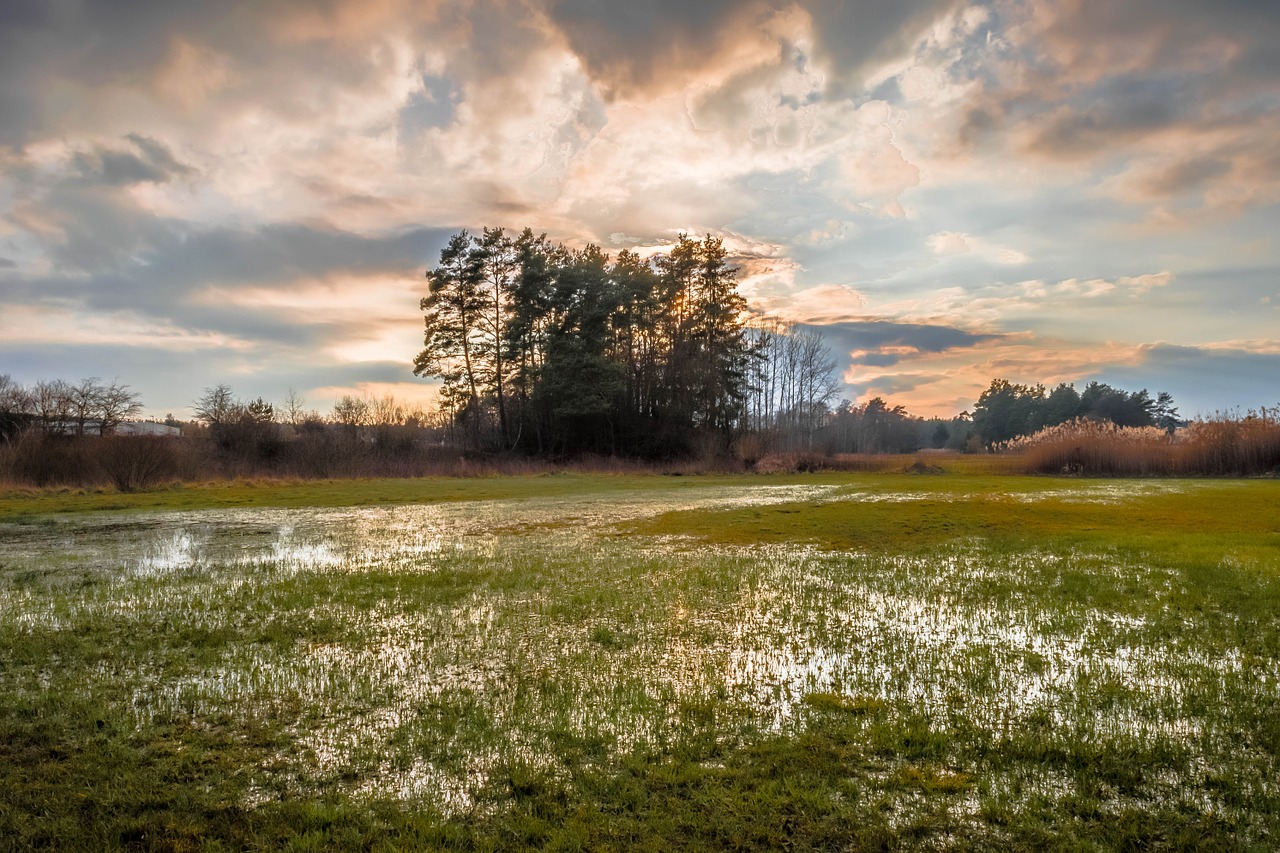
By Dr. Thomas P. Cook, special to Statehouse Report | Living through a pandemic has taught us lessons we couldn’t learn in a classroom. As a medical educator, I’m hopeful one silver lining from this devastating situation is understanding the connection between public health and the vitality of our state, country and planet.

Right now, we can comprehend the importance of preparing for a global public health emergency in a way we couldn’t have one year ago. Just as public resources are dedicated to maintaining armed forces in times of peace, responsible governing means preparing for all realistic global threats. COVID-19 felt like it came out of nowhere, but scientists warned us that a disease outbreak of this magnitude could strike at any point. Plagues have occurred throughout recorded human history.
As policymakers reassess risk-management efforts and global security priorities in the aftermath of the coronavirus, it’s imperative that the impacts of climate change be included in conversations about public health policy. What does climate change have to do with public health? A lot, actually. In 2009, a committee of The Lancet, an internationally-renowned, peer-reviewed medical journal dating back to the 1800s, wrote that “(c)limate change is the biggest global health threat of the 21st century.” The impacts of climate change, they argued more than a decade ago, “will be felt all around the world — and not just in some distant future but in our lifetimes and those of our children.”
Climate change is already affecting public health globally, nationally and right here in South Carolina.
When we talk of our changing climate, we think of rising temperatures. Here in the South in recent years, we’ve felt milder winters and longer, hotter summers. These changes may not drastically affect our day-to-day lives, but sustained increased temperatures, even marginal increases, exacerbate pre-existing health issues. Many of these are common among South Carolinians, including diabetes, chronic lung disease, and cardiovascular disease.
We’ve also faced bigger storms and more of them in recent years. Hurricane season starts earlier and ends later. Coastal evacuations are an annual affair. Increases in extreme weather are a consequence of climate change and pose definite health and safety risks. Even their aftermath can create health hazards. Hurricanes and storms leave residual dampness in buildings that have flooded. Damp indoor environments cause mold contamination and increase prevalence of asthma and respiratory infections.
Remember last October when you swatted a mosquito after the leaves had fallen from the trees? The impacts of climate change influence the transmission of diseases like Lyme disease and West Nile virus spread by “vectors,” such as mosquitoes, fleas and ticks.
These are just a few examples, but for nearly every measurable impact to our planet caused by a changing climate, there’s a related public health impact.
Throughout the coronavirus crisis, we heard many public figures utter the words, “We are all in this together.” Well, we are all in this together — this planet. The Earth is ours to share. All of us require air to breathe and water to drink, and all of us are impacted personally when our shared environment is threatened.
These changes are already affecting our lives and our health and will continue to do so. Just as we dedicate resources and attention to preparing for global security threats, we must dedicate resources and attention to preparing for global health threats.
As South Carolina leaders, let’s act on sound science and tackle the global challenge of climate change before we have to learn any more global public health lessons the hard way.
Because we ARE all in it together. After all we’ve endured this past year, this is perhaps the greatest lesson of all.
Dr. Thomas P. Cook is the program director at Prisma Health Richland Hospital Emergency Medicine Residency Program in Columbia.
Yes, budgets are important
To the editor:
Government Financial Officers Association (GFOA) established the Distinguished Budget Presentation Awards Program (Budget Awards Program), but while it is technically correct the award budgets do not communicate well to the local citizen.
An attempt to overcome the budget denseness and reporting of it to overcome the obtuseness is found in the annual awards for clearer communication and relevance. Here are the 2020 winners: https://www.gfoa.org/2020-awards-for-excellence-winners .
Curtis Loftis is the state treasurer of South Carolina. He has made some attempts to better communicate his data. Budget presentation to the average non-financial person is not on his radar yet. It should be. Better stories can result.
— Fred Palm, Edisto Island, S.C.
Send us your thoughts
We love hearing from our readers and encourage you to share your opinions. But to be published, you’ve got to provide us with contact information so we can verify your letters. Letters to the editor are published weekly. We reserve the right to edit for length and clarity. Comments are limited to 250 words or less. Please include your name and contact information.
-
- Send your letters or comments to: feedback@statehousereport.com
Brick buildings
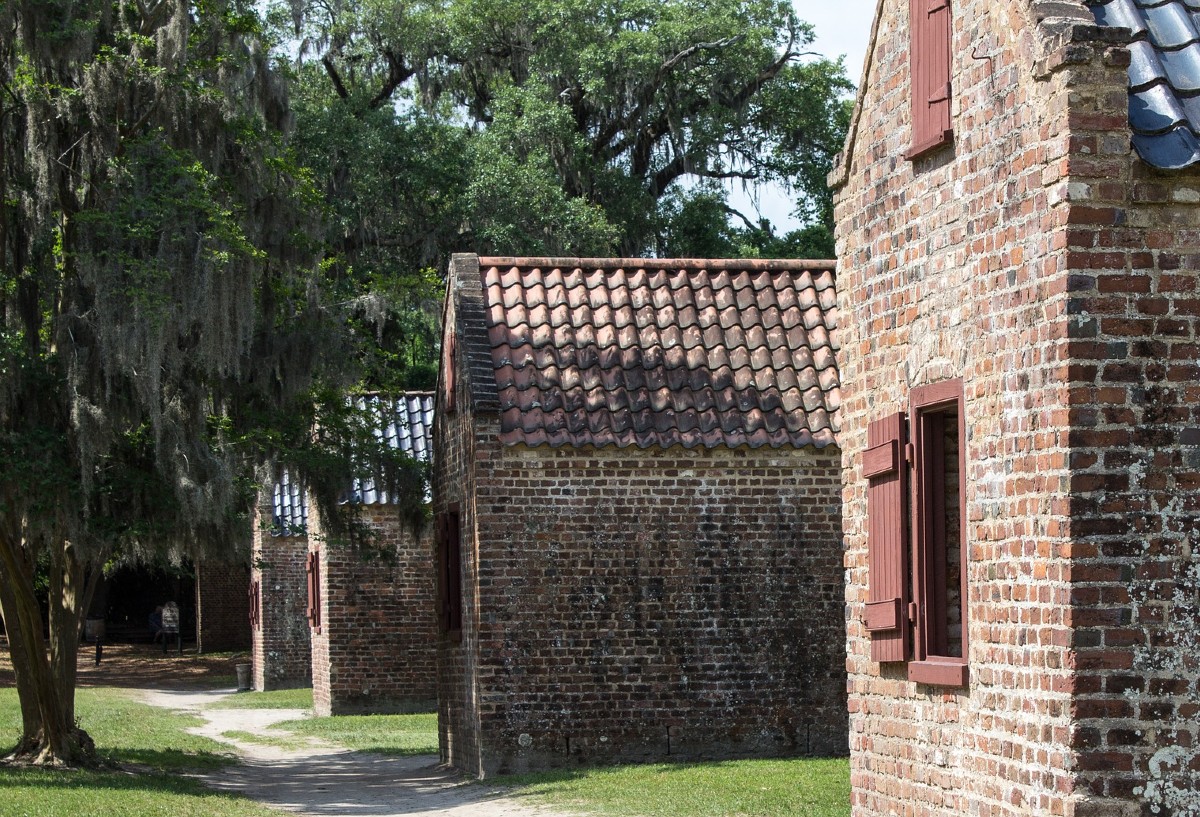
What and where are these brick buildings? Send your guess to feedback@statehousereport.com — and remember to include your name, home city and contact information.
 Last week’s mystery, “Another bridge” was too doggone easy. It showed an interesting angle of the Liberty Bridge at Falls Park on the Reedy River in Greenville, but its unique look allowed lots of readers to identify it.
Last week’s mystery, “Another bridge” was too doggone easy. It showed an interesting angle of the Liberty Bridge at Falls Park on the Reedy River in Greenville, but its unique look allowed lots of readers to identify it.
Hats off to these sleuths: Jay Altman, Elizabeth Jones, Susan James, Donna McGreevy, Mary Greene and John Hart, all of Columbia; Daniel Prohaska of Summerville; Penny Forrester of Tallahassee,Fla.; Kevin Mertens of Greenville; Allan Peel of San Antonio, Texas; Faith Line of Anderson; Greg Nowell of Oconee; George Graf of Palmyra, Va.; Steve Willis of Lancaster; Jacie Godfrey, Pam Little-McDaniel and Barry Wingard, all of Florence; Elaine Huff-Lowe of Inman; Dave Taylor of Darlington; and Bill Segars of Hartsville.
Peel provided some context about the 345-foot-long suspension foot-bridge: “The single-span, single-cable suspension bridge has two inclined towers and was first opened to the public in 2004. At 345-feet long, 12-feet wide and 8-inches thick, the concrete reinforced deck is supported by a single suspension cable. The $4.5 million structure was funded by the City of Greenville’s Hospitality Tax, designed by bridge architect Miquel Rosales of Boston, and engineered by Schlaich Bergermann. Chris Britton, structural division manager for Taylor and Murphy, describes the bridge as ‘an ultra lightweight bridge, which almost looks like it’s floating on air.’”
- Send us a mystery. If you have a photo that you believe will stump readers, send it along (but make sure to tell us what it is because it may stump us too!) Send to: feedback@statehousereport.com and mark it as a photo submission. Thanks.
 ORDER NOW: Copies are in Lowcountry-area bookstores now, but if you can’t swing by, you can order a copy online today.
ORDER NOW: Copies are in Lowcountry-area bookstores now, but if you can’t swing by, you can order a copy online today.
ABOUT STATEHOUSE REPORT
Statehouse Report, founded in 2001 as a weekly legislative forecast that informs readers about what is going to happen in South Carolina politics and policy, is provided to you at no charge every Friday.
Meet our team
- Editor and publisher: Andy Brack, 843.670.3996
- Special correspondent: Lindsay Street
Donate today
We’re proud to offer Statehouse Report for free. For more than a dozen years, we’ve been the go-to place for insightful independent policy and political news and views in the Palmetto State. And we love it as much as you do.
But now, we can use your help. If you’ve been thinking of contributing to Statehouse Report over the years, now would be a great time to contribute as we deal with the crisis. In advance, thank you.
Buy the book
 Now you can get a copy of editor and publisher Andy Brack’s We Can Do Better, South Carolina! ($14.99) as a paperback or as a Kindle book ($7.99). . The book of essays offers incisive commentaries by editor and publisher Andy Brack on the American South, the common good, vexing problems for the Palmetto State and interesting South Carolina leaders.
Now you can get a copy of editor and publisher Andy Brack’s We Can Do Better, South Carolina! ($14.99) as a paperback or as a Kindle book ($7.99). . The book of essays offers incisive commentaries by editor and publisher Andy Brack on the American South, the common good, vexing problems for the Palmetto State and interesting South Carolina leaders.
More
- Mailing address: Send inquiries by mail to: P.O. Box 21942, Charleston, SC 29413
- Subscriptions are free: Click to subscribe.
- We hope you’ll keep receiving the great news and information from Statehouse Report, but if you need to unsubscribe, go to the bottom of the weekly email issue and follow the instructions.
- Read our sister publications: Charleston City Paper (every Wednesday) | Charleston Currents (every Monday).
- © 2021, Statehouse Report, a publication of City Paper Publishing, LLC. All rights reserved.



Pingback: The Captain's Journal » Hysterical Opposition To S.C Open Carry